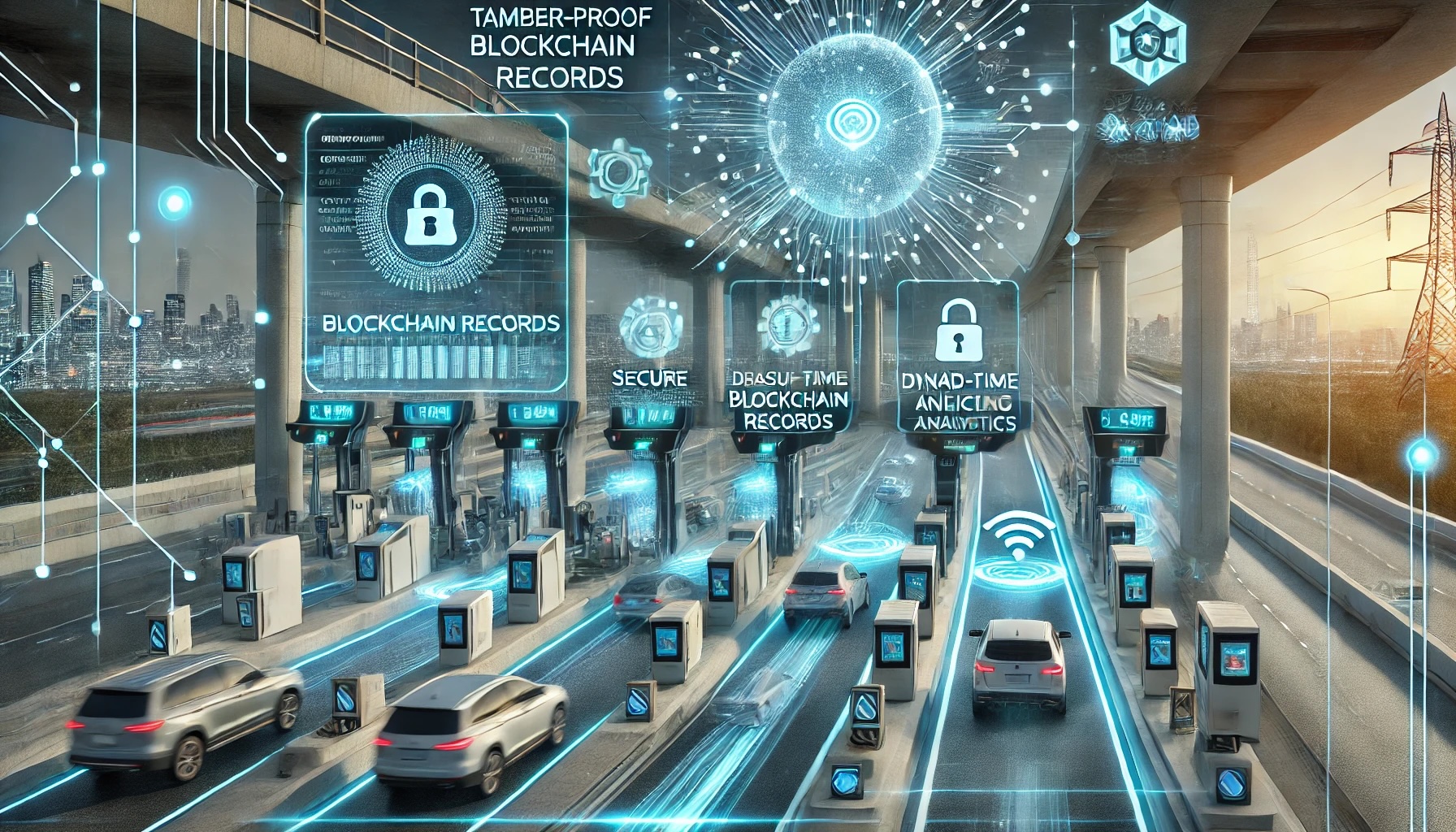- By - Joe Soliz
- December 7, 2024
- Comments (0)
As transportation infrastructure evolves, electronic toll systems are transforming how roads are managed and maintained. Yet, challenges such as fraud, privacy concerns, and revenue leakage persist, eroding public trust in toll collection processes. To address these issues, the convergence of two cutting-edge technologies—Blockchain and Artificial Intelligence (AI)—offers a revolutionary solution. Together, they can create a tolling system that is not only efficient but also transparent and secure.
The Role of Blockchain in Toll Collection
At its core, blockchain is a decentralized digital ledger that records transactions across multiple systems in a way that is secure, transparent, and tamper-proof. In toll collection, blockchain provides:
- Immutable Records: Every toll transaction is logged and permanently recorded, ensuring an unalterable history of payments. This eliminates disputes over inaccuracies or fraudulent entries.
- Transparency: All stakeholders—drivers, operators, and regulators—can access the ledger to verify transactions, fostering trust.
- Smart Contracts: Automated agreements within the blockchain can enforce rules such as dynamic pricing, ensuring compliance without manual intervention.
- Decentralization: By eliminating reliance on a single central authority, blockchain reduces risks associated with data breaches or operational failures.
AI’s Contribution to Tolling Systems
Artificial intelligence excels at processing large volumes of data, identifying patterns, and making real-time decisions. In tolling, AI enhances:
- Dynamic Pricing: AI analyzes traffic patterns, time of day, and environmental factors to adjust toll rates dynamically, optimizing road usage and revenue generation.
- Fraud Detection: Advanced machine learning algorithms identify irregularities such as cloned RFID tags or license plate tampering, reducing toll evasion.
- Predictive Maintenance: AI monitors tolling infrastructure, predicting maintenance needs before failures occur, minimizing downtime.
- Personalized User Experience: By analyzing user behavior, AI offers tailored suggestions, such as preferred payment methods or optimal travel times.
The Synergy of Blockchain and AI in Tolling
Individually, blockchain and AI provide powerful benefits to tolling systems. Together, they create a synergy that addresses the shortcomings of each technology while amplifying their strengths. Key advantages include:
1. Enhanced Data Security
AI’s ability to process vast datasets is complemented by blockchain’s immutable ledger. While AI detects anomalies and prevents fraudulent activity, blockchain ensures the integrity of the underlying data. This dual-layered security is crucial in protecting sensitive information such as payment details and vehicle identifiers.
2. Real-Time Transparency
Blockchain provides an open and auditable record of transactions, while AI processes this data to generate insights in real-time. For instance, stakeholders can instantly verify toll payments and analyze patterns, enhancing accountability and trust.
3. Efficient Dispute Resolution
Disputes over toll charges are a common issue. Blockchain’s tamper-proof record, combined with AI-driven analytics, enables quick and accurate resolution. Drivers and operators can access transaction histories and AI-verified evidence to settle disagreements without lengthy investigations.
4. Smart, Automated Systems
AI integrates with blockchain-based smart contracts to enforce rules autonomously. For example, a smart contract could automatically adjust toll rates based on AI-detected traffic conditions, eliminating the need for manual intervention.
5. Sustainability and Cost Efficiency
AI’s predictive capabilities ensure efficient use of resources, while blockchain reduces administrative overhead by automating processes. Together, they create a cost-effective system that minimizes waste and promotes sustainable practices.
Overcoming Challenges
While the combination of blockchain and AI offers significant promise, it is not without challenges:
- Scalability: Blockchain systems must handle the high transaction volumes generated by tolling systems without compromising speed or efficiency.
- Integration Complexity: Merging AI and blockchain into existing tolling infrastructure requires careful planning and investment.
- Data Privacy: While blockchain ensures transparency, safeguarding user privacy remains a critical concern. Advanced encryption and access control measures are essential.
The Road Ahead
The integration of blockchain and AI into tolling systems represents a paradigm shift in how transportation infrastructure is managed. Early adopters of these technologies will set new benchmarks for efficiency, transparency, and security, paving the way for widespread implementation.
For policymakers and industry leaders, investing in blockchain-AI solutions is not merely an opportunity—it is a necessity to future-proof tolling systems against evolving challenges. As these technologies mature, their combined potential will transform tolling into a model of accountability and innovation, benefitting governments, operators, and the public alike.
In an era where trust is paramount, blockchain and AI stand as the perfect duo to ensure tolling systems are not only transparent and secure but also equitable and forward-thinking.
